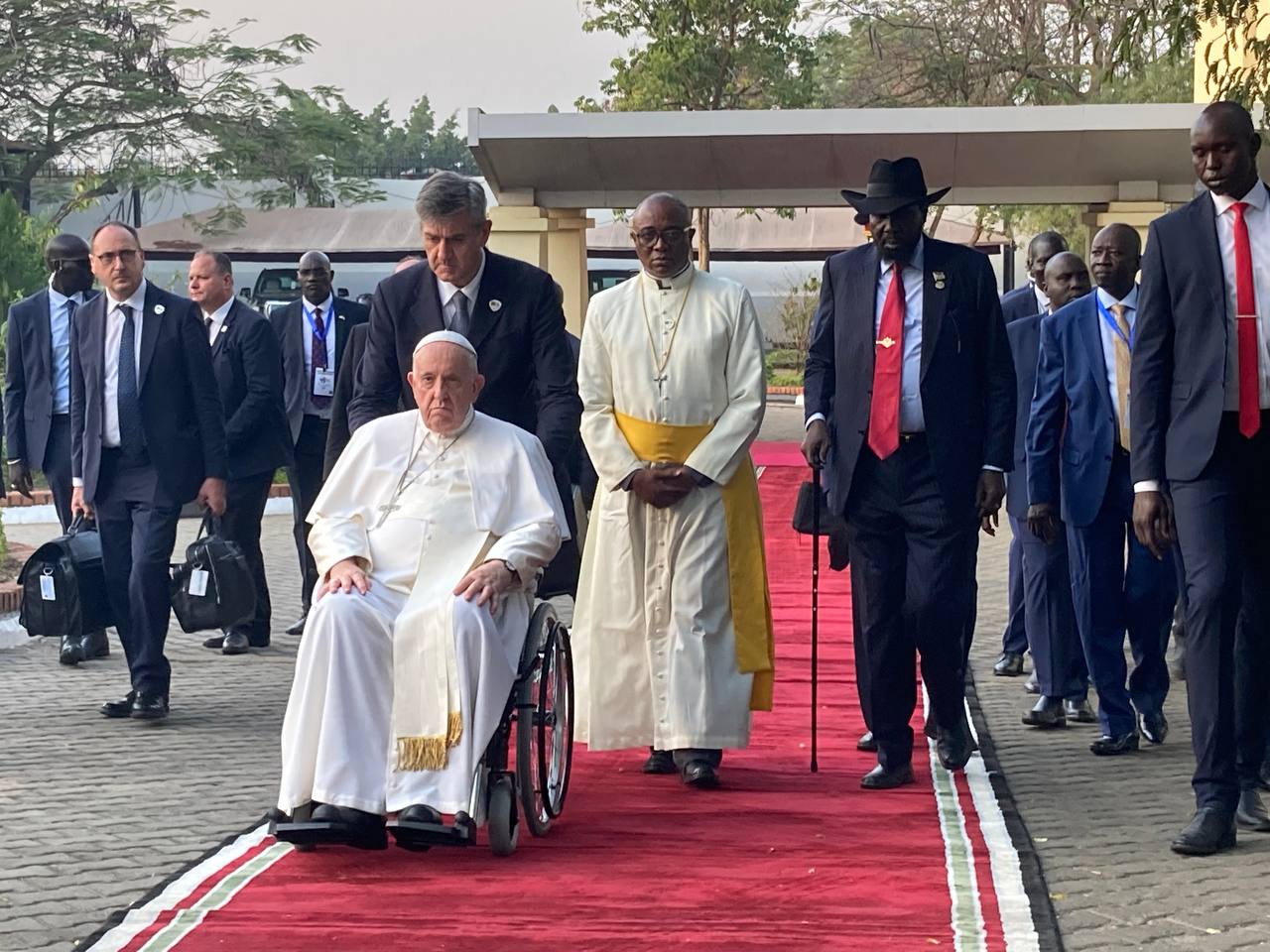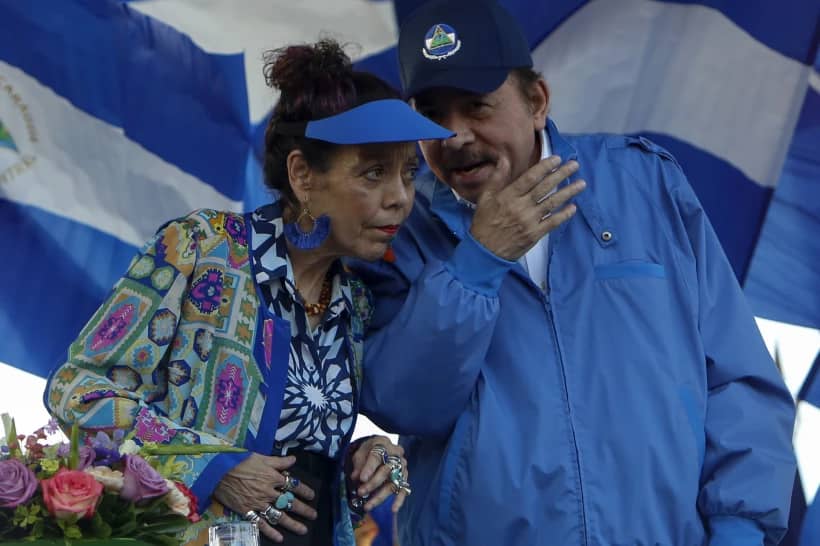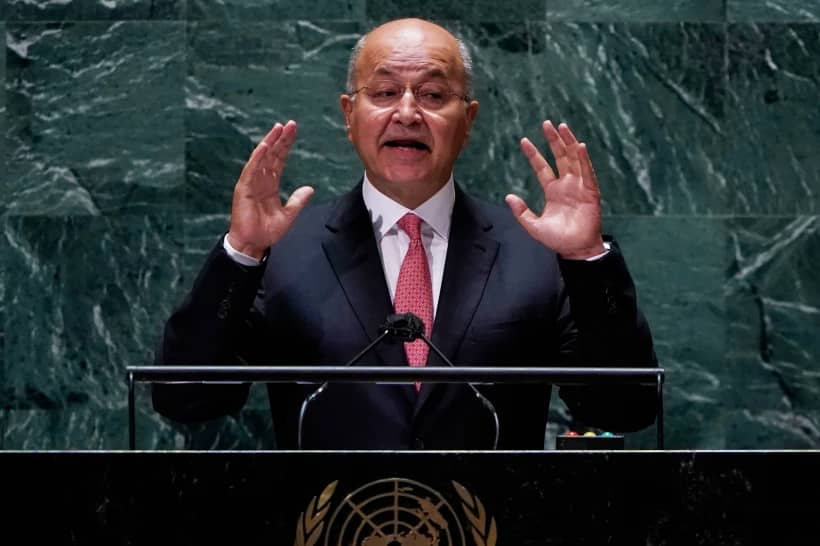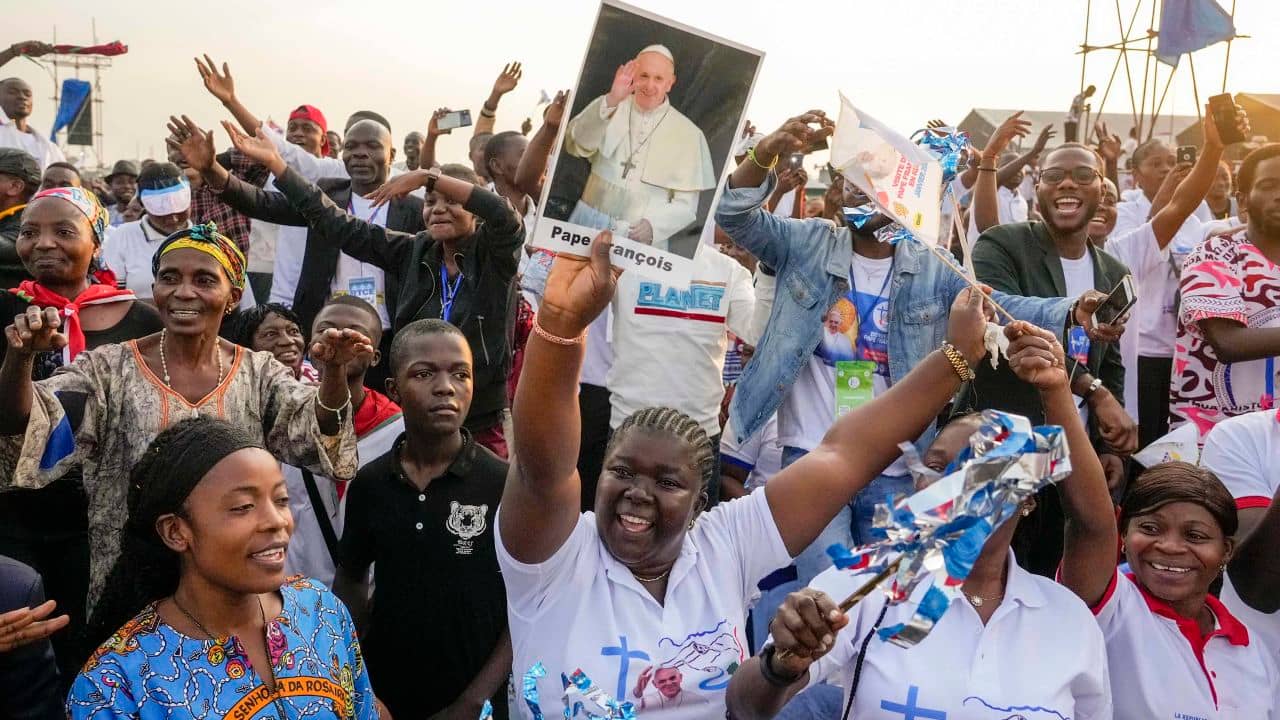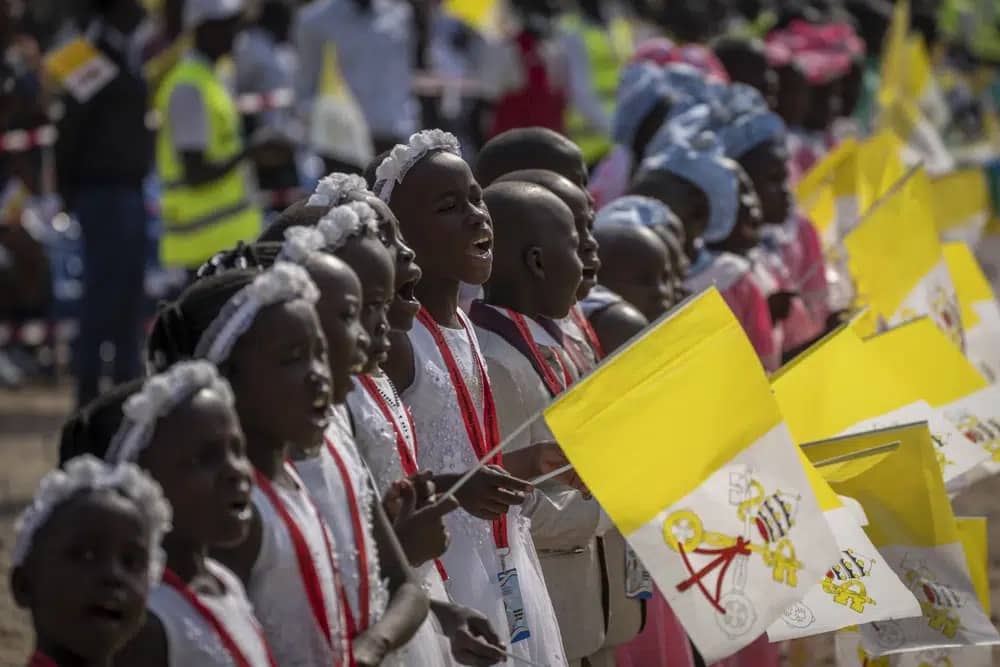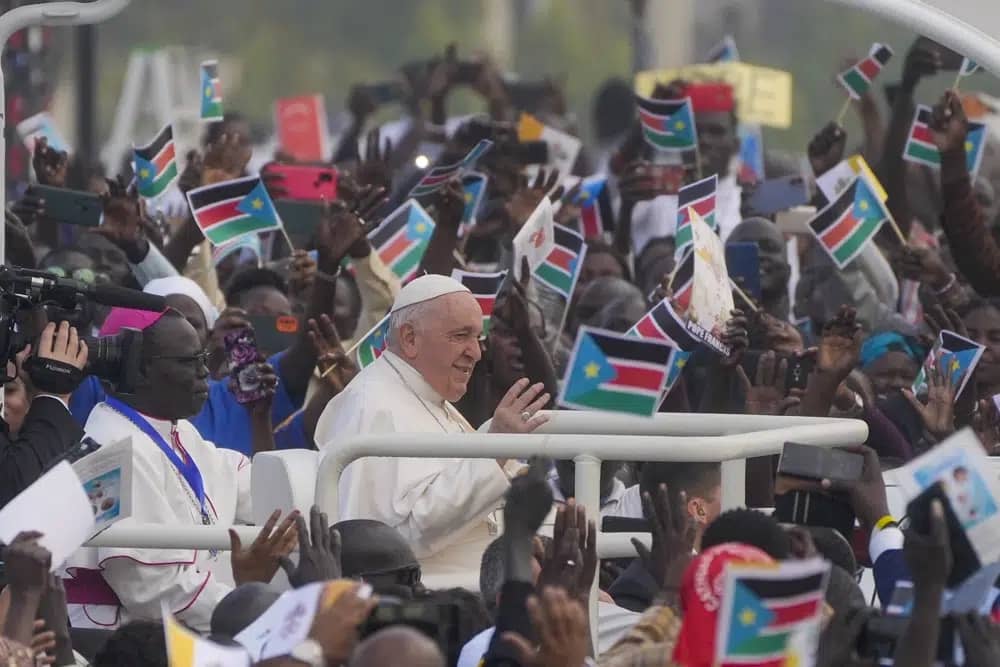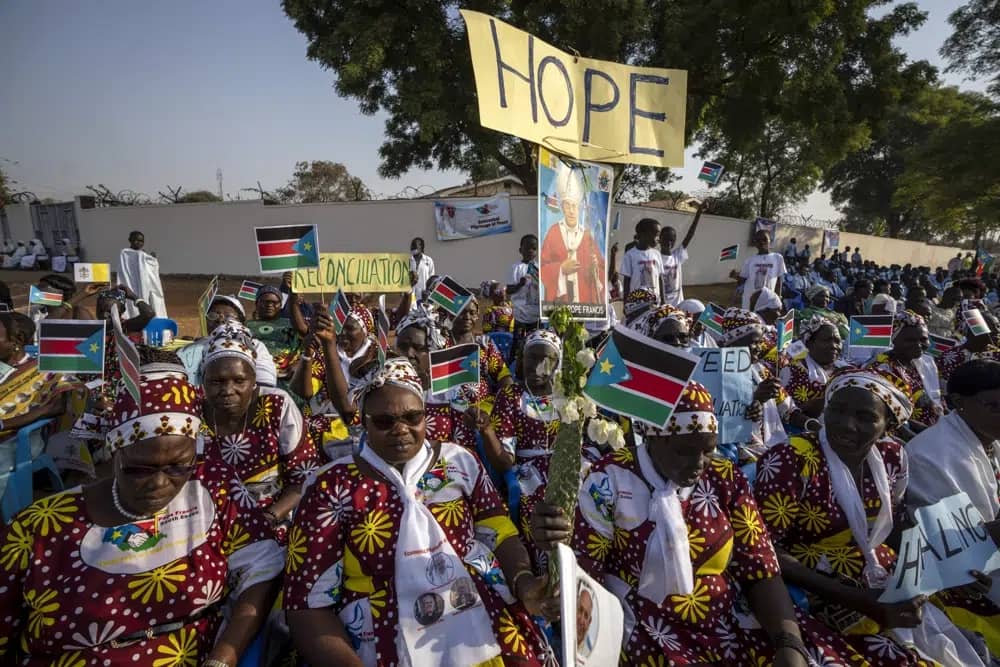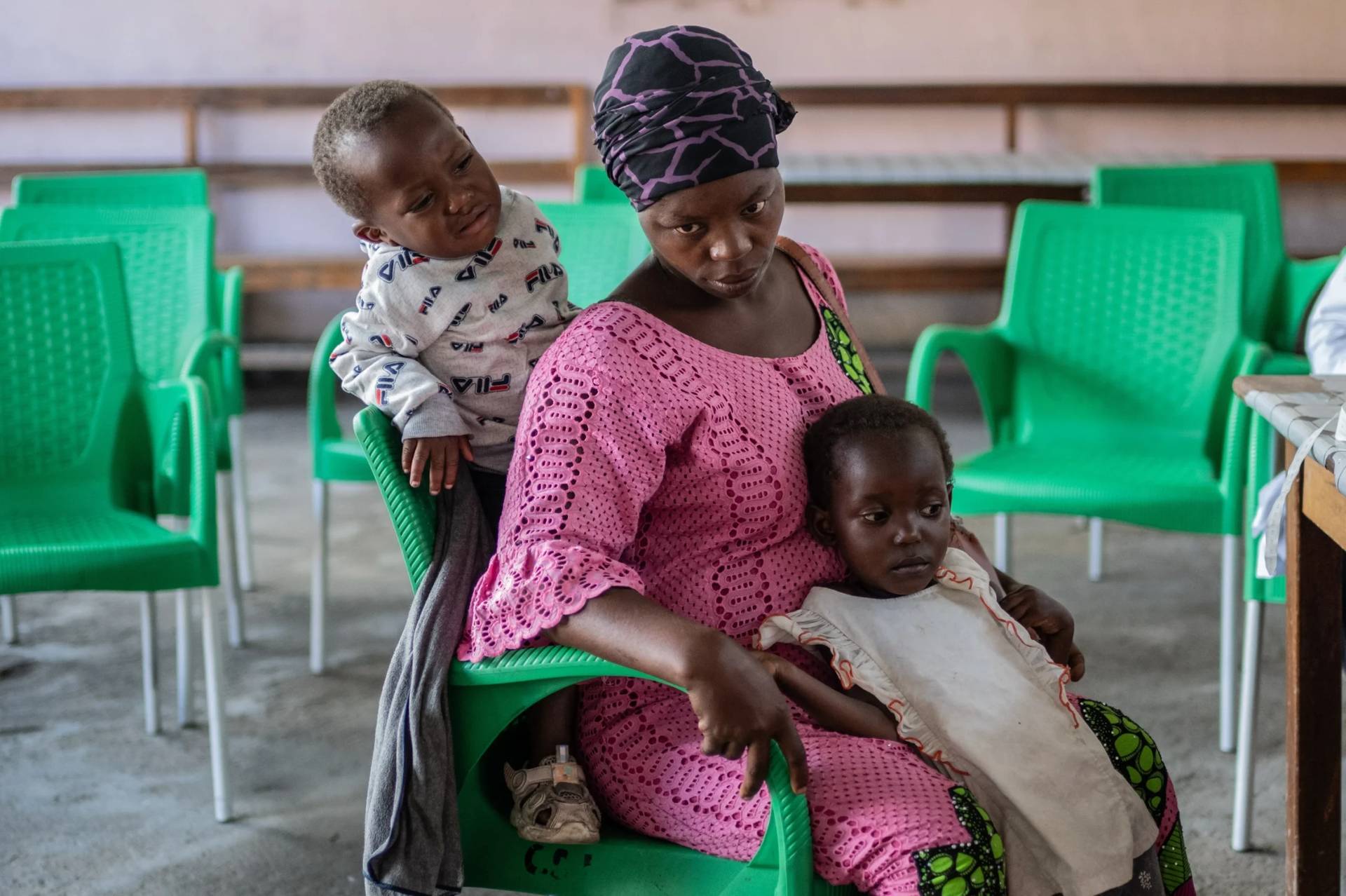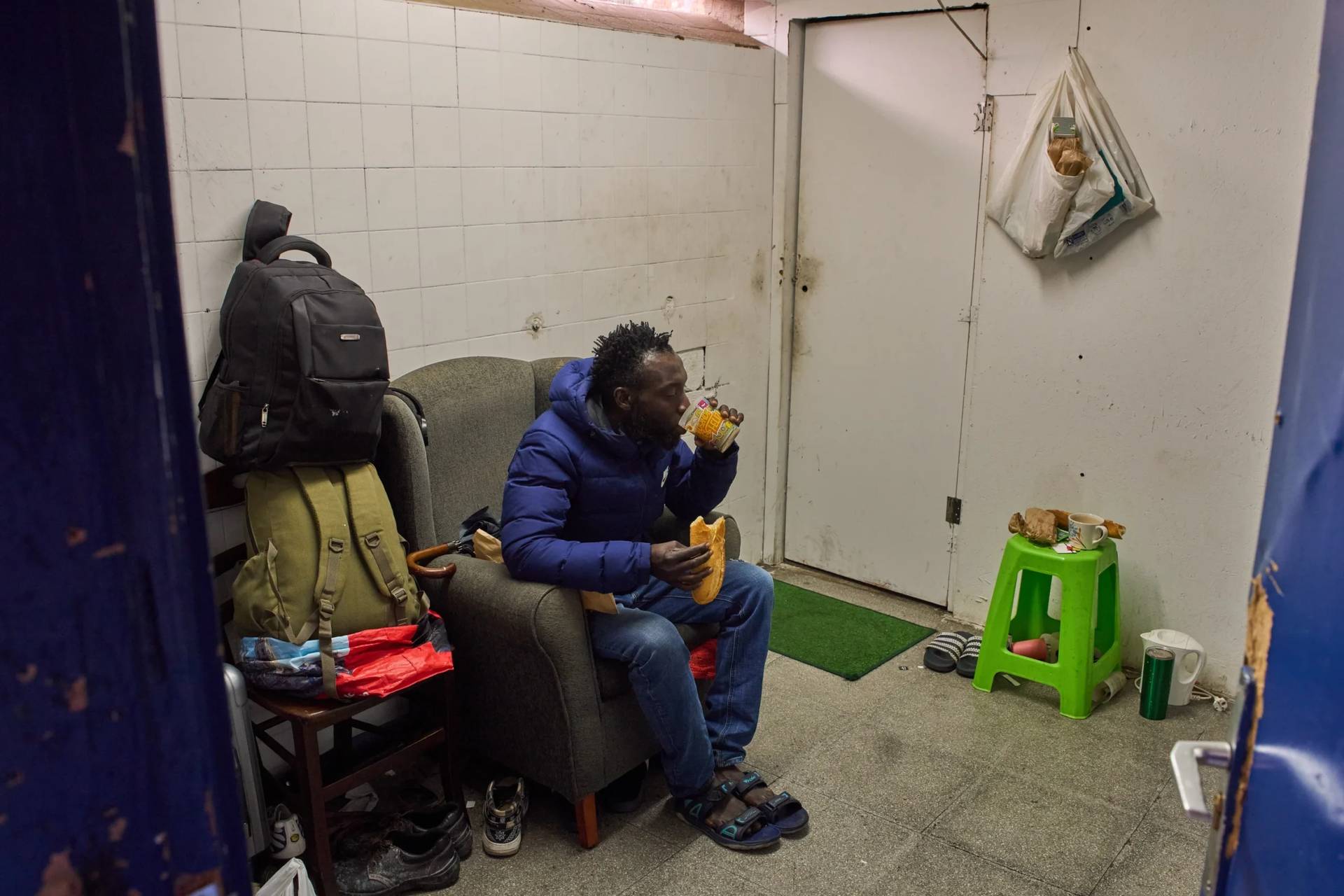JUBA – Pope Francis on Friday fulfilled a longtime goal of visiting South Sudan when he arrived in the country’s capital city of Juba Friday alongside other Christian leaders, lamenting, in a frank opening speech, an ongoing delay in the nation’s peace process and urging its leaders to get serious.
In his lengthy Feb. 3 speech, the pope said the entire people of South Sudan “weeps for the violence it endures, its persistent lack of security, its poverty and the natural disasters that it has experienced.”
“Years of war and conflict seem never to end and, even recently there have been bitter clashes,” he said.
Just a day before the pope’s arrival, 20 people were killed, several more injured, and thousands displaced in what were reportedly clashes over cattle disputes in Kajo-Keji County in South Sudan’s Central Equatoria State, to which Juba belongs.
While violence runs rampant, “the process of reconciliation seems stagnant and the promise of peace unfulfilled,” the pope said, voicing hope that the “protracted suffering” of the people “not be in vain.”
South Sudanese leaders “are called to renew the life of society as pure sources of prosperity and peace,” he said, saying the people “need fathers, not overlords; they need steady steps towards development, not constant collapses.”
Speaking from South Sudan’s presidential palace after holding separate private meetings with South Sudanese President Salva Kiir and the five vice presidents, including Kiir’s opposition rival, Riek Machar, the pope told authorities they will be remembered only “if you work for the benefit of this people that you have been called to serve.”
“Future generations will either venerate your names or cancel their memory, based on what you now do,” he said.
Recalling a 2019 spiritual retreat held at the Vatican attended by both Kiir and Machar as the immediate implications of the country’s latest peace deal were being negotiated, Francis insisted that, “Now is the time to say, ‘No more of this,’ without ‘ifs’ or ‘buts.’”
“No more bloodshed, no more conflicts, no more violence and mutual recriminations about who is responsible for it, no more leaving your people athirst for peace. No more destruction: it is time to build! Leave the time of war behind and let a time of peace dawn!” he said.
Kiir appeared to get the message, announcing that in honor of the pope’s visit he will lifting a government-imposed suspension of peace talks that had been initiated in Rome under the aegis of the Community of Sant’Egidio and invited opposition groups to join in brokering an “inclusive peace.”
In what is his 40th trip abroad, Pope Francis arrived in South Sudan Friday after spending three and a half days in the Democratic Republic of Congo. He will be in Juba until Sunday on an official ecumenical visit alongside the Archbishop of Canterbury, Justin Welby, and the Moderator of the Church of Scotland, Reverend lain Greenshields.
His visit to Juba marks the first time a pope has visited South Sudan since its independence in July 2011, after a lengthy war with neighboring Sudan.
Violent conflict erupted in South Sudan just two years later, in December 2013, between different factions of the government, who were divided along tribal lines, throwing the newly-formed country into its own, internal full-on war.
Tensions boiled over when South Sudanese President Salva Kiir, a Catholic and a member of the prominent Dinka tribe, accused his vice president, Riek Machar, a member of the rival Nuer tribe, of attempting to stage a coup, and while Machar denied the allegation, he fled and led an armed resistance.
An attempted ceasefire in 2014 failed to stop the fighting, and likewise, a 2015 “Compromise Peace Agreement” that saw Macher’s return to Juba and his reinstatement as vice president, also fell through, prompting Machar to again flee as his opposition forces continued to fight.
Several other opposition groups then popped up, furthering the violence and bloodshed, as easy access to weapons compounded local disputes.
Currently, poverty and hunger are rampant as a result of the conflict, with around one million people experiencing high food insecurity in conflict areas, and millions of children lack education.
In 2018, an official power-sharing peace agreement was struck, resulting in the formation of a new coalition government in 2020 in which Kiir maintained his status as president, and Machar was named the first of five vice presidents.
Pope Francis has repeatedly advocated for peace in South Sudan and for years has voiced his desire to visit the country. His visit to the DRC and South Sudan was originally slated to take place last year but was postponed due to the pope’s ongoing knee troubles, which since last spring have largely confined him to a wheelchair and the use of a cane.
With the help of the Sant’Egidio Community, one of the so-called “new movements” in the church dedicated to social justice, Francis hosted Kiir and Machar as well as opposition leaders at the Vatican for a special retreat in 2019, during which he bent down on his knees and kissed their feet, asking them to make peace.
While much of the violence stopped with the signing of that agreement, as more and more opposition forces added their signatures to the accord, there is still fighting throughout South Sudan at the local level, mainly related to land or tribal disputes, or hooligans with easy access to military weapons.
However, while the peace agreement continues to hold, it has yet to be fully implemented, with several requirements – such as the creation of a unified army and the holding of national elections – yet to come to fruition.
Pope Francis in his speech said that to be a true republic “means seeing yourselves as truly ‘public,’ ‘of the people;’ it is to declare that the state belongs to everyone.”
“Consequently, those entrusted with greater responsibilities, presiding over and governing it, have the duty to place themselves at the service of the common good,” he said, and cautioned against using power “for our own advantage.”
He spoke of South Sudan’s vast resources, with oil being among the most prominent, saying the country’s economic recovery “should coincide with proposals for an equitable distribution of wealth.”
Francis called for the growth of “a sound democracy” in South Sudan, saying this process is “essential to the life of a republic,” “preserves a healthy distinction of powers,” and “presupposes respect for human rights, upheld by law and the application of law.”
As the country’s peace process moves forward, he voiced hope that it “will not proceed unevenly, but, starting from this capital, will take a course that can be navigated and not be bogged down by inertia.”
“Dear friends, it is time to move from words to deeds. It is time to turn the page: it is the time for commitment to an urgent and much-needed transformation,” he said, saying the process of peace and reconciliation in South Sudan “requires a new start.”
He voiced hope that the ecumenical visit would be an opportunity for a resumption of dialogue absent of “duplicity and opportunism,” and would be an occasion “to revive hope” among the people.
“Let each citizen understand that the time has come to stop being carried along by the tainted waters of hatred, tribalism, regionalism and ethnic differences,” he said.
Pope Francis stressed the importance of dialogue in overcoming hatred, resentment, and violence, and the necessity of accepting and encountering others, “even if it means a step backwards,” a significant remark given calls in recent years for Kiir to resign.
Condemning widespread corruption, the pope said “inequitable distribution of funds, secret schemes to get rich, patronage deals, lack of transparency: all these pollute the riverbed of human society; they divert resources from the very things most needed.”
Pope Francis also stressed the need to fight poverty, which he said fuels hatred, division, and violence, and condemned the widespread access to weapons in South Sudan.
Many things are needed in South Sudan, he said, “but surely not more instruments of death!”
To this end, he called for the development of better healthcare and increased investment in education with the goal of increasing literacy among the population, and also underlined the importance of fostering positive regional ties and strong relationships with neighboring countries.
Francis closed his speech telling Kiir and other authorities that what he said “may appear blunt and direct,” but he assured them that this frankness “arises only from the affection and concern with which I follow the life of your country, together with my brothers with whom I have come here as a pilgrim of peace.”
“We wish to offer you our heartfelt prayers and our support, so that South Sudan can experience reconciliation and a change of direction” he said, praying that the country’s efforts to move forward “no longer be overwhelmed by the flood of violence, mired in the swamps of corruption and blocked by the inundation of poverty.”
“May the Lord of heaven, who loves this land, grant it a new season of peace and prosperity,” he said.
Follow Elise Ann Allen on Twitter: @eliseannallen
